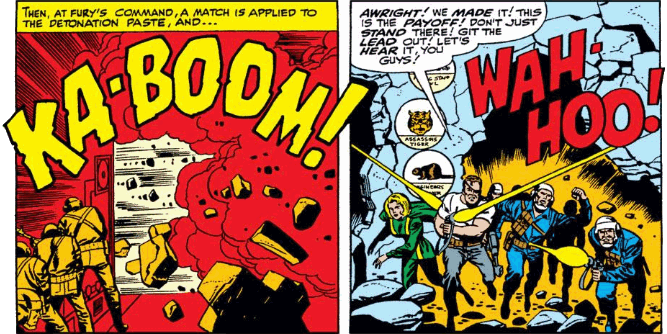If you were around in 1966, you had a lot more to be worried about than the Vietnam War, Batman's latest death trap, New York's striking public transportation workers, the flooding of Florence, China's "cultural revolution," Reagan entering politics, or the new mini-skirt causing males to walk into doors. We unsuspecting civilians also had to contend with the rise of Hydra, the sinister organization bent on world domination or, failing that, its destruction.
But if we're to believe this startling cover of Strange Tales, our problems with Hydra may finally be over! Seriously?
Yet if Hydra bites it, what happens then to S.H.I.E.L.D.? And Nick Fury?
There's room to speculate on SHIELD's true origins, but their story appears to begin in conjunction with Fury's, the man brought in to lead the spy organization in its (apparent) charter mission, the destruction of Hydra. Fury's appointment, as well as the enormous investment of agents and hardware (including a mammoth helicarrier), made it seem like both Fury and SHIELD were in it for the long haul--but was a long conflict with the same villains ever sustainable for a comics mag? Even as only part of a mag that shared billing with another hero (the format of Strange Tales at the time)?
And so after just five issues of Hydra/SHIELD conflict, it looks like things are already coming to a head for both sides, with Hydra putting into orbit a deadly bomb meant to force the governments of the world to capitulate.
The final conflict is fought on two fronts, with Fury and his men attacking the Supreme Hydra's base (with the help of the Supreme Hydra's daughter, who's switched sides)--while Tony Stark attempts to disarm the orbital device using a special ship of his design called (and I apologize in advance) the Braino-saur. (Which can't help but make you wonder if Stark was on the sauce even in 1966.)
As for Hydra, as SHIELD closes in we get the same sense of inevitability that must have descended on the last days of Hitler--only in the Supreme Hydra's case, the focus is more on the fate of his daughter, who will die due to his actions. In addition, we're really only talking about the destruction of one Hydra base, and Hydra itself is presumably far more extensive than a building that can be evacuated. But the tone of the story nevertheless suggests that Hydra is crumbling, including its leader.
As is evident, already Stan Lee's narrative is paving the way for life after Hydra for SHIELD and Fury--and a good thing, too, because Stark, SHIELD, and Fury (along with his task force) are all ready to end this chapter and move on. Of course, if Hydra was the binding force here for SHIELD's mission, the question is: to what?
For Hydra, it seems, the curtain is ringing down forever. As for the Supreme Hydra, he doesn't get the chance to detonate the base, though his daughter will be spared--all because of a case of mistaken identity.
In the issues that follow, SHIELD turns its attention to the forces of A.I.M. But if you were expecting a bunch of criminal scientists in pillbox hoods and mesh face masks to compete with green cowls and goggles, think again, because all too soon we see (you guessed it) the end of A.I.M.!
SHIELD villains are dropping like flies! Pretty soon that helicarrier will have FOR RENT signs pasted in its windows. Obviously SHIELD's mission statement has to be adjusted--after all, a worldwide enforcement/spy organization isn't going to have much to do if they put the bag on all the worldwide criminal/spy organizations. But what if everybody was under one big Hydra umbrella?
And sooner than you can say "Hail Hydra!", SHIELD has a reason to stay in the world espionage business, with Hydra itself a perpetual nemesis in one form or another.

















No comments:
Post a Comment